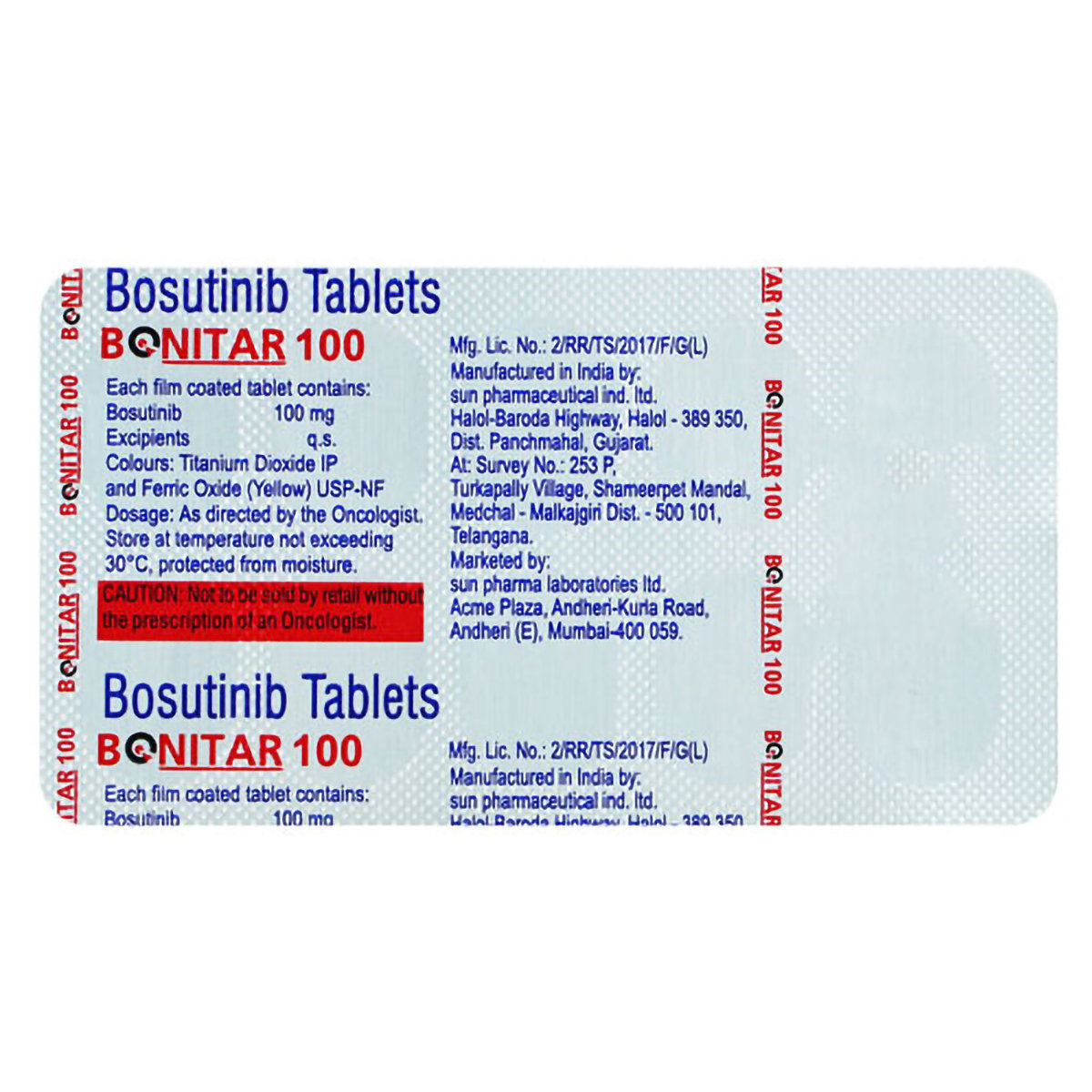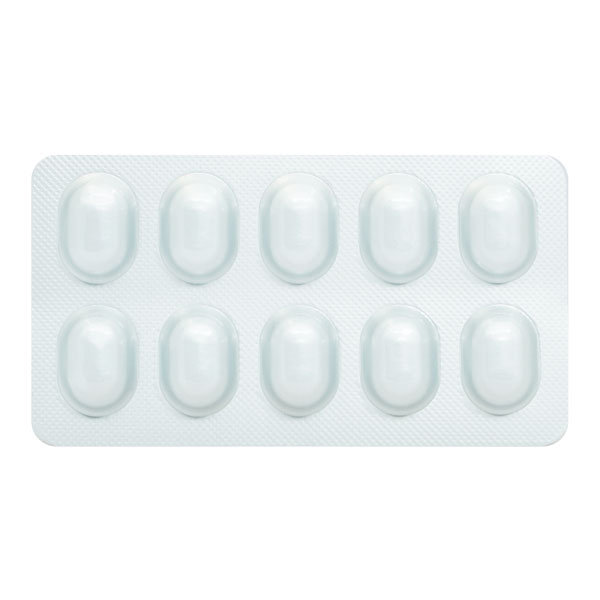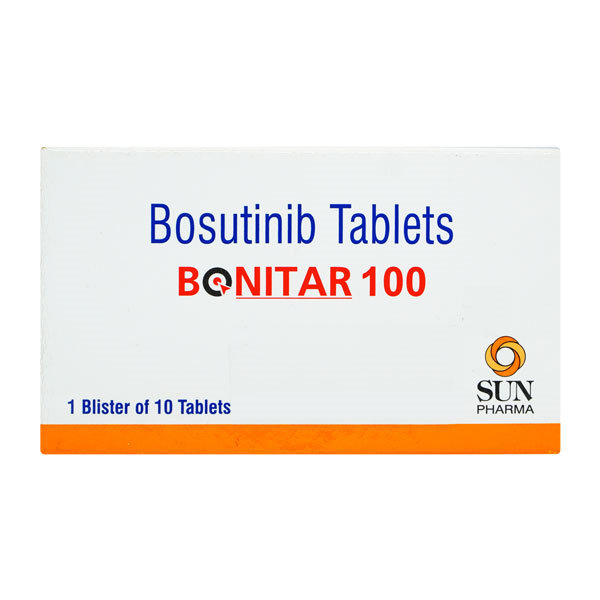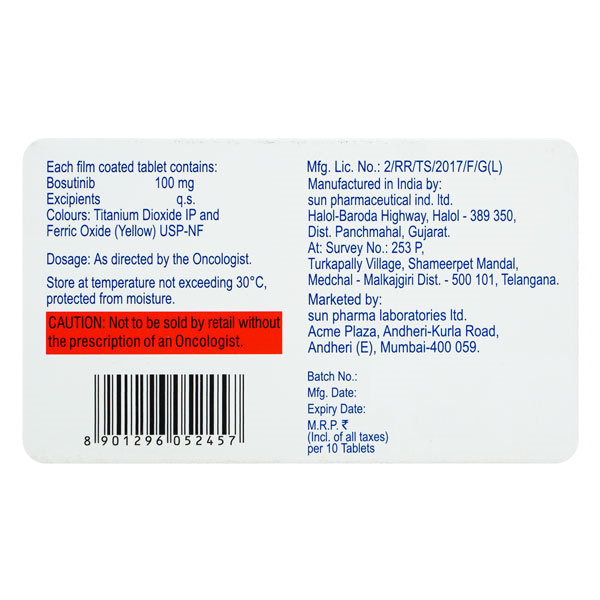Bonitar 100 Tablet 10's
MRP ₹853
(Inclusive of all Taxes)
₹128.0 Cashback (15%)
Provide Delivery Location
Online payment accepted
 Prescription drug
Prescription drugWhats That
Composition :
Manufacturer/Marketer :
Consume Type :
Expires on or after :
Return Policy :
About Bonitar 100 Tablet
Bonitar 100 Tablet is an anti-cancer medicine used in the treatment of Leukemia. Leukemia, also known as blood cancer, is a cancer of blood cells or blood-forming tissues. It causes excessive production of immature white blood cells by the bone marrow and reduces the body’s ability to fight infections. Bonitar 100 Tablet is used in the treatment of chronic myelogenous leukemia (CML). This medicine is used in patients with chronic, accelerated, or blast phase Ph+ (Philadelphia chromosome-positive) chronic myelogenous leukemia who are resistant or intolerant to prior therapy.
Bonitar 100 Tablet contains Bosutinib, which belongs to the class of kinase inhibitors. It works by inhibiting the action of abnormal proteins that cause the multiplication of cancerous cells. This helps stop the abnormal growth of cancer cells and thus reduce the further spread to other parts of the body.
Bonitar 100 Tablet may cause certain side effects, such as rash, fatigue, headache, back pain, decreased platelet count, back pain, nausea, vomiting, diarrhea, abdominal pain, loss of appetite, and dizziness. These side effects do not require medical attention and gradually resolve over time. However, if the side effects persist or worsen, please consult your doctor. Bonitar 100 Tablet should be taken as advised by your doctor. Do not take more than the recommended dose of medicine. Your doctor will decide the dose of Bonitar 100 Tablet based on the severity of your condition.
Bonitar 100 Tablet should be avoided if you are allergic to it or any other components present in it. Let your doctor know about your complete medical history, including current medication, to rule out any side effects/interactions. Before taking this medicine, inform your doctor if you have liver/kidney disease, gastrointestinal toxicity, myelosuppression, fluid retention, and hepatic toxicity, as may cause serious side effects or worsen such conditions. This medicine is known to cause embryo-fetal toxicity. Hence, inform your doctor if you are pregnant or are planning to become pregnant before starting the treatment with Bonitar 100 Tablet . Breastfeeding should be discontinued in nursing mothers during the treatment. Bonitar 100 Tablet is not recommended for use in children below 18 years of age as the safety and efficacy are not established.
Uses of Bonitar 100 Tablet
Directions for Use
Key Benefits
Bonitar 100 Tablet contains Bosutinib, which belongs to the class of kinase inhibitors. It works by inhibiting the action of abnormal proteins that cause the multiplication of cancerous cells. This helps stop the abnormal growth of cancer cells and thus reduce the further spread to other parts of the body.
Storage
- Inform Your Doctor: Notify your doctor immediately about your diarrhoea symptoms. This allows them to adjust your medication or provide guidance on managing side effects.
- Stay Hydrated: Drink plenty of fluids to replace lost water and electrolytes. Choose water, clear broth, and electrolyte-rich drinks. Avoid carbonated or caffeinated beverages to effectively rehydrate your body.
- Follow a Bland Diet: Eat easy-to-digest foods to help firm up your stool and settle your stomach. Try incorporating bananas, rice, applesauce, toast, plain crackers, and boiled vegetables into your diet.
- Avoid Trigger Foods: Steer clear of foods that can worsen diarrhoea, such as spicy, fatty, or greasy foods, high-fibre foods, and dairy products (especially if you're lactose intolerant).
- Practice Good Hygiene: Maintain good hygiene to prevent the spread of infection. To stay healthy, wash your hands frequently, clean and disinfect surfaces regularly, and avoid exchanging personal belongings with others.
- Take Anti-Diarrheal Medications: If your doctor advises, anti-diarrheal medications such as loperamide might help manage diarrhoea symptoms. Always follow your doctor's directions.
- Keep track of your diarrhoea symptoms. If they don't get better or worse or are accompanied by severe stomach pain, blood, or dehydration signs (like extreme thirst or dark urine), seek medical help.
- Managing a low platelet count (thrombocytopenia) caused by medication usage requires a multi-step approach. Here are some steps to help manage the condition:
- Inform your doctor about your low platelet count and medication usage. They will assess the situation and guide the best course of action.
- Your doctor may recommend adjusting or stopping the medication that is causing a low platelet count. This could involve switching to alternative medication or reducing the dosage.
- Monitor your platelet count regularly through blood tests to track any changes. This will help the doctor determine the effectiveness of the treatment plan.
- If an underlying condition, such as infection or inflammation, contributes to the low platelet count, your doctor will treat it.
- In some cases, alternative treatments like platelet transfusions or medications that stimulate platelet production may be necessary.
- Avoid risky activities and certain medications; eat a balanced diet with plenty of water to reduce bleeding risk and boost overall health.
- If you experience severe bleeding or bruising, seek emergency medical attention immediately.
- Drink water or other clear fluids.
- To prevent worsening of pain, limit intake of tea, coffee, or alcohol.
- Include bland foods like rice, toast, crackers, and rice in your diet.
- Avoid lying down immediately after eating as it may cause indigestion or heartburn.
- Avoid acidic and spicy food as it may cause indigestion.
- Preventing Vomiting (Before it Happens)
- Take medication exactly as prescribed by your doctor. This can help minimize side effects, including vomiting.
- Having a small meal before taking your medication can help reduce nausea and vomiting.
- Talk to your doctor about taking anti-nausea medication along with your prescribed medication.
- Managing Vomiting (If it Happens)
- Try taking ginger in the form of tea, ale, or candy to help alleviate nausea and vomiting.
- What to Do if Vomiting Persists
- Consult your doctor if vomiting continues or worsens, consult the doctor for guidance on adjusting your medication or additional treatment.
- Skin rash caused by allergies is due to irritants or allergens. Therefore, avoid contact with such irritants.
- Consult your doctor for proper medication and apply an anti-itch medication. Follow the schedule and use the medication whenever needed.
- Protect your skin from extreme heat and try to apply wet compresses.
- Soak in the cool bath, which gives a soothing impact to the affected area.
- Inform your doctor immediately if you experience a fever after starting a new medication.
- Your doctor may adjust your medication regimen or dosage as needed to minimize fever symptoms.
- Monitor your body temperature to monitor fever progression.
- Drink plenty of fluids, such as water or electrolyte-rich beverages, to help your body regulate temperature.
- Get plenty of rest and engage in relaxation techniques, such as deep breathing or meditation, to help manage fever symptoms.
- Under the guidance of your doctor, consider taking medication, such as acetaminophen or ibuprofen, to help reduce fever.
- If your fever is extremely high (over 103°F), or if you experience severe symptoms such as confusion, seizures, or difficulty breathing, seek immediate medical attention.
- Rest well; get enough sleep.
- Eat a balanced diet and drink enough water.
- Manage stress with yoga and meditation.
- Limit alcohol and caffeine.
- Physical activities like walking or jogging might help boost energy and make you feel less tired.
Drug Warnings
Bonitar 100 Tablet should be avoided if you are allergic to it or any other components present in it. Let your doctor know about your complete medical history, including current medication, to rule out any side effects/interactions. Before taking, inform your doctor if you have liver/kidney disease, diabetes, cardiac problems, increased blood pressure, gastrointestinal toxicity, myelosuppression, fluid retention, and hepatic toxicity, as the use of Bonitar 100 Tablet in these patients may cause serious side effects. This medicine is known to cause embryo-fetal toxicity. Hence, inform your doctor if you are pregnant or are planning to become pregnant before starting the treatment. Breastfeeding should be discontinued in nursing mothers during the treatment. Bonitar 100 Tablet is not recommended for use in children below 18 years of age as the safety and efficacy are not established. Avoid alcohol consumption and smoking, as it can lead to serious adverse effects.
Drug-Drug Interactions
Drug-Drug Interactions
Login/Sign Up
Combining Yellow fever vaccine with Bonitar 100 Tablet can increase the risk of infection.
How to manage the interaction:
Taking Yellow fever vaccine with Bonitar 100 Tablet can result in an interaction, but it can be taken if prescribed by a doctor. Do not stop using any medications without consulting a doctor.
Coadministration of disopyramide with Bonitar 100 Tablet can increase the risk of an irregular heart rhythm that may be serious.
How to manage the interaction:
Although there is an interaction between Bonitar 100 Tablet and disopyramide, they can be taken together if prescribed by a doctor. However, consult your doctor if you experience sudden dizziness, lightheadedness, fainting, or shortness of breath. Do not discontinue any medications without consulting a doctor.
Coadministration of Bonitar 100 Tablet with Voriconazole may significantly increase the blood levels of Bonitar 100 Tablet which increases the risk of side effects.
How to manage the interaction:
Although taking Bonitar 100 Tablet and Voriconazole together can result in an interaction, they can be taken together if prescribed by a doctor. However, if you experience dizziness, fever, muscle pain, red or inflamed skin, and pain or burning during urination, consult a doctor. Do not stop using any medications without consulting a doctor.
Coadministration of Droperidol with Bonitar 100 Tablet can raise the risk of an abnormal heart rhythm.
How to manage the interaction:
Although there is an interaction between Bonitar 100 Tablet with droperidol, they can be taken together if prescribed by a doctor. However, consult your doctor if you experience sudden dizziness, lightheadedness, fainting, or shortness of breath. Do not discontinue any medications without consulting a doctor.
Using chloroquine together with Bonitar 100 Tablet can increase the risk of an irregular heart rhythm.
How to manage the interaction:
Although there is an interaction between Bonitar 100 Tablet and Chloroquine, it can be taken together if prescribed by a doctor. However, consult a doctor if you experience sudden dizziness, lightheadedness, fainting. Do not discontinue any medications without consulting a doctor.
Taking Bonitar 100 Tablet and Anagrelide together can raise the risk of an abnormal heart rhythm.
How to manage the interaction:
Although there is an interaction between Bonitar 100 Tablet and Anagrelide, they can be taken together if prescribed by a doctor. However, consult a doctor if you experience sudden dizziness, lightheadedness, fainting, or shortness of breath. Do not discontinue any medications without consulting a doctor.
Taking Bonitar 100 Tablet with mipomersen can cause liver problems.
How to manage the interaction:
Although there is an interaction between Bonitar 100 Tablet and Mipomersen, they can be taken together if prescribed by a doctor. However, consult a doctor if you experience fever, chills, joint pain or swelling, itching, loss of appetite, fatigue, abdominal pain, dark urine, pale stools, and/or yellowing of the skin or eyes. Do not discontinue any medications without consulting a doctor.
Taking Bonitar 100 Tablet and Iloperidone together can raise the risk of an abnormal heart rhythm.
How to manage the interaction:
Although there is an interaction between Bonitar 100 Tablet and Iloperidone, they can be taken together if prescribed by a doctor. However, consult your doctor if you experience sudden dizziness, lightheadedness, or fainting. Do not discontinue any medications without consulting a doctor.
Taking Bonitar 100 Tablet and Ziprasidone together can raise the risk of an abnormal heart rhythm.
How to manage the interaction:
Although there is an interaction between Bonitar 100 Tablet and Ziprasidone, they can be taken together if prescribed by a doctor. However, consult a doctor if you experience sudden dizziness, lightheadedness, or fainting. Do not discontinue any medications without consulting a doctor.
Taking Bonitar 100 Tablet and Pasireotide together can raise the risk of an abnormal heart rhythm.
How to manage the interaction:
Although taking Bonitar 100 Tablet and Pasireotide together can cause an interaction, they can be taken together if prescribed by a doctor. However, consult a doctor if you experience sudden dizziness, lightheadedness, or fainting. Do not discontinue any medications without consulting a doctor.
Drug-Food Interactions
Drug-Food Interactions
Login/Sign Up
Grapefruit Juice, Grapefruit
How to manage the interaction:
Taking grapefruit or grapefruit juice with Bonitar 100 Tablet can increase the blood levels and effects of Bonitar 100 Tablet, which may increase the risk of side effects. Avoid the consumption of grapefruit and grapefruit juice.
Diet & Lifestyle Advise
- After your treatment begins, several dietary adjustments can help you control side effects.
- Anyone suffering from a chronic illness, including cancer, should consume foods high in protein, healthy fats, whole grains, and vitamins and minerals.
- Plant-based proteins are among the greatest meals to take during chemotherapy or other cancer treatments. They have the highest concentrations of vitamins and minerals, such as nuts, seeds, beans, and legumes.
- Eat a healthy diet and exercise regularly to maintain proper weight.
- Include leafy vegetables, citrus fruits, fatty fish, berries, yoghurt, apples, peaches, cauliflower, cabbage, broccoli, beans, and herbs.
- De-stress yourself by meditating, reading books, taking a warm bubble bath or listening to soothing music.
- Get optimal sleep; rest well.
- Avoid smoking and alcohol consumption.
- Avoid fast and fried food, processed meats, refined carbs and added sugars.
Side Effects of Bonitar 100 Tablet
- Nausea
- Diarrhoea
- Painful urination
- Decreased platelet count
- Fatigue
- Edema
- Vomiting
- Diarrhea
- Abdominal pain
- Headache
- Back pain
- Cough
- Dizziness
- Skin rash
Habit Forming
Therapeutic Class
All Substitutes & Brand Comparisons
RX
Bosutris 100 mg Tablet 120's
Mylan Pharmaceuticals Pvt Ltd
₹85.5
(₹0.58 per unit)
99% CHEAPERRX
Out of StockBosuvi 100 mg Tablet 60's
Glenmark Pharmaceuticals Ltd
₹5450
(₹81.75 per unit)
16% COSTLIER
Author Details
We provide you with authentic, trustworthy and relevant information
Drug-Diseases Interactions
Drug-Diseases Interactions
Login/Sign Up
FAQs
Drug-Drug Interactions Checker List
- PANTOPRAZOLE
- ESOMEPRAZOLE
- RITONAVIR
- ITRACONAZOLE
- KETOCONAZOLE
- CLARITHROMYCIN
- ERYTHROMYCIN
- RIFAMPICIN
- PHENYTOIN
- PHENOBARBITAL
- CARBAMAZEPINE
Special Advise
- Bonitar 100 Tablet should be administered only by a trained and experienced oncologist.
- A blood test should be performed such as LFT and RFT, to check for liver/kidney function.
- Weekly blood tests should be done during the treatment to check for CBC (Complete blood count).
Disease/Condition Glossary
Philadelphia chromosome-positive (Ph+) chronic myeloid leukemia: Leukemia, also known as blood cancer, is a cancer of blood cells or blood-forming tissues. It causes excessive production of immature white blood cells by the bone marrow and reduces the body’s ability to fight infections. Chronic Myelogenous Leukemia is a type of blood cancer that originates in the myeloid cells or stem cells in your bone marrow. Ph+ chronic myeloid leukemia is a common form of CML that occurs when specific chromosomes swap position. This causes a chromosome abnormality, creating the Philadelphia chromosome. The abnormal chromosomes produce an abnormal protein called Bcr-Abl tyrosine kinase, which then triggers a signal to produce abnormal white blood cells in the bone marrow. Symptoms may include fatigue, fever, weight loss, and loss of appetite.

Have a query?
Alcohol
Safe if prescribed
Avoid alcohol consumption while on treatment with Bonitar 100 Tablet to prevent serious adverse effects.
Pregnancy
Consult your doctor
Bonitar 100 Tablet is not recommended for use in pregnancy as it may harm your fetus. Hence, if you are pregnant or planning pregnancy, inform your doctor before taking Bonitar 100 Tablet . Your doctor may prescribe this medicine if the benefits outweigh the risks.
Breast Feeding
Consult your doctor
Limited data is available on the effect of Bonitar 100 Tablet on breastfeeding. Bonitar 100 Tablet should be avoided during breastfeeding. Hence, inform your doctor if you are breastfeeding. Your doctor may prescribe an alternative based on the symptoms and health condition.
Driving
Safe if prescribed
Bonitar 100 Tablet may cause dizziness and may make you feel drowsy. Hence, avoid driving or operating machines after taking Bonitar 100 Tablet or until you become alert.
Liver
Consult your doctor
Bonitar 100 Tablet is known to cause hepatotoxicity. Hence, inform your doctor if you have a pre-existing or a history of liver disease. A dose adjustment may be needed based on your condition.
Kidney
Consult your doctor
If you have a pre-existing or a history of kidney disease, inform your doctor before taking Bonitar 100 Tablet . Your doctor may reduce the dose of this medicine or prescribe a suitable alternative based on your condition.
Children
Safe if prescribed
Bonitar 100 Tablet is not recommended for use in children below 18 years of age as the safety and efficacy are not established.
Heart
Inform your doctor if you have heart disease before using Bonitar 100 Tablet . Your doctor will prescribe only if the benefits outweigh the risks.
Geriatrics
Consult your doctor
Bonitar 100 Tablet may require dose adjustment in elderly patients based on their condition and medical requirements.












.jpg?tr=q-85)

